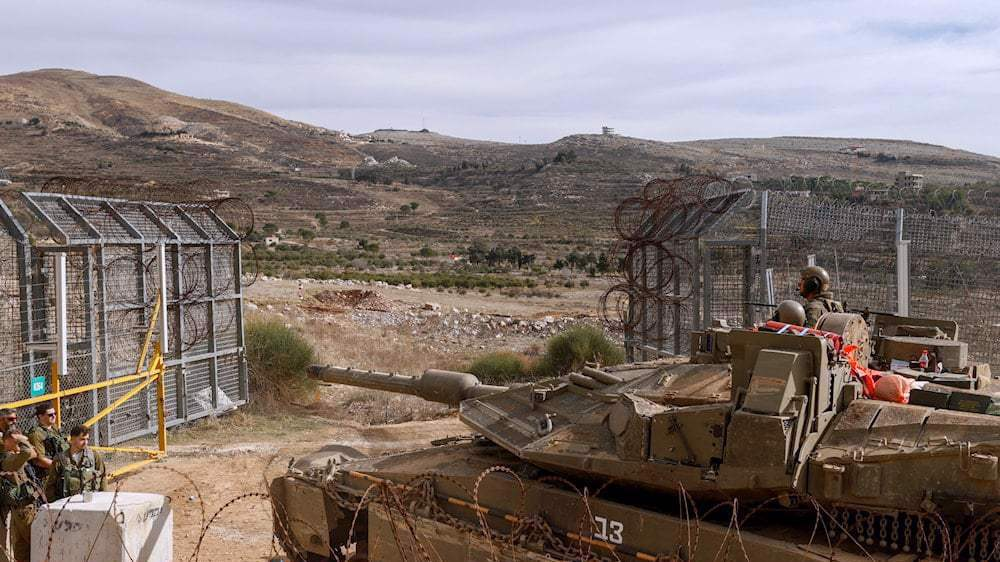
Israeli military forces cross the fence to the buffer zone with Syria near the Majdal Shams region in Golan Heights on December 11, 2024.
Damascus, December 13 (RHC)-- Israeli forces have advanced further into southern Syria after their ground troops moved deeper into the Syrian Golan Heights, effectively expanding their occupation.
Sources said Israeli soldiers entered the town of al-Hurriya in Quneitra province on Thursday as part of the regime's unprecedented onslaught on Syria following President Bashar al-Assad's ouster.
Local sources said Israeli forces also carried out a forced evacuation of the residents of the village of Rasem al-Ruwadi in the region. Israeli occupying forces on Wednesday evening stormed the towns of Ruwaihinah and Umm Batna in the central countryside of Quneitra as well.
Residents of the town said the occupying regime forces asked them to evacuate their homes to annex them to the so-called buffer zones. The incursion involved tanks and infantry units, during which several houses were searched.
It came after Israeli minister of military affairs Israel Katz said the regime is planning a "sterile defense zone" in southern Syria in violation of the 1974 disengagement agreement between the two sides.
Community leaders and residents of Quneitra have refused to evacuate their villages. They have collectively decided to remain in their homes in the face of Israeli advances. Since the fall of President Assad, the Israeli regime has carried out almost 500 airstrikes across Syria, targeting critical civilian and military infrastructures
Several regional nations have denounced the Israeli aggression, reaffirming their commitment to protect the Arab country’s sovereignty and territorial integrity.
On Thursday, a UN source said Israeli troops were obstructing the work of UN peacekeepers in the occupied Golan Heights. He explained that the Israeli army has transferred forces to the area, restricting the movement of peacekeeping forces significantly and hindering their operational tasks.
After the fall of President Assad at the weekend, Israeli prime minister Benjamin Netanyahu announced the cancellation of the 1974 disengagement agreement with Syria.
He ordered the deployment of Israeli forces in the buffer zone in the Golan, which separates the occupied part of the heights from the rest of Syrian territory.
Netanyahu also said the Golan Heights, an area Israel captured during the 1967 war with Syria and has occupied ever since, would be “forever part of Israel”, thanking US President-elect Donald Trump once again for supporting the regime’s occupation in 2019.
The United Nations and most of the international community recognize the Golan as part of Syria.
The Israeli prime minister has noted that he had promised on October 9, 2023 to “change the face of the Middle East.”
Israeli soldiers have reportedly taken positions 10 km beyond the buffer zone in the town of Qatana, just 25 km from the Syrian capital.
Many Syrians and others watching the fast-moving pace of events say Netanyahu is using this moment of change in their country to permanently seize further territory. “They are saying they will give it back, but they are already occupying the Golan Heights which they haven’t given back. What would make you believe they will give this back?” Haid Haid, a senior consulting associate fellow at Chatham House, told Middle East Eye.
Rime Allaf, a Syrian writer and political analyst, posted on X that Israel’s actions are “an illegal and immoral literal invasion of yet more land & a theft of Syrians’ right to their own army, destroyed by Israel the minute the monstrous regime fell.”
Ameer Makhoul, a Palestinian activist and writer, said Israel’s “flagrant violations” were being carried out with little outcry from the international community. He believes the goal is to make the new Syrian government “accept the fait accompli that it imposes through the expanded occupation and by destroying Syria forces and cancelling its sovereignty.”
Israel has wiped out Syrian naval vessels, sea-to-sea missiles, helicopters and planes, including the entire fleet of MiG-29 fighter jets and stockpiles of ammunition in attacks on at least five air bases.
The regime says it is destroying any means by which militant groups in Syria could attack Israel. But Haid said even before the Israeli strikes this week, Syria would have been unable to effectively attack Israel with its existing military infrastructure.
Now that Israel has essentially destroyed any capabilities it had to strike, he again questioned why it would need to take positions in or beyond the demilitarized zone. He also pointed to reports that Israel and militant groups in Syria have previously come to successful arrangements whereby Israel provided emergency aid and medical care to militants so long as the groups did not attack the Zionist regime.
He said with militants and Takfiri groups in control, Syria has now been left defenseless. “The problem now is no matter what happens, the Syrians might not be able to protect themselves, not only against Israel, but against other threats that might be domestic,” Haid said.
Netanyahu said late on Tuesday that Israel won’t interfere in internal affairs in Syria.
Some observers said they don’t buy his promise, saying they believe Israel, in addition to seizing territory for keeps, is trying to halt a functional, post-Assad Syrian state before it can even start.

